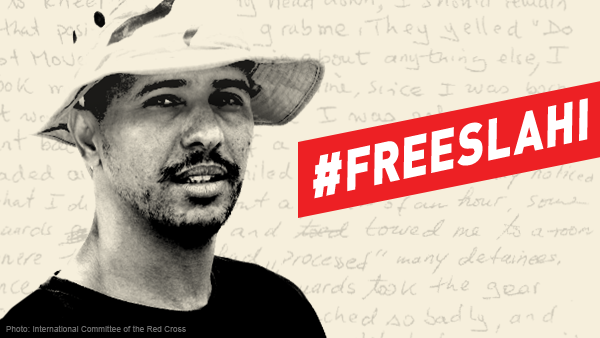Guantánamo Prisoner’s Book Is Released
ACLU Launches “Free Slahi” Campaign, Actors Read Excerpts Online
January 20, 2015
FOR IMMEDIATE RELEASE
CONTACT: 212-549-266, media@aclu.org
NEW YORK – In a first, a book written by a Guantánamo prisoner was published today in the United States and several other countries.
Mauritanian citizen Mohamedou Ould Slahi has been at the detention camp since 2002, and the U.S. has never charged him with a crime. The book, “Guantánamo Diary,” is a first-person account of his rendition, torture, and interrogations, as well as day-to-day life and personal relationships at Guantánamo.
The American Civil Liberties Union is part of the legal team representing Slahi in his legal fight to be set free. In 2010, a federal district court judge ordered him released, but the Obama administration successfully appealed. The case was sent back to the district court with instructions to use looser standards to decide whether someone can be held, and the matter is now awaiting further action from the court.
“Today we’re glad that Mohamedou Slahi’s book is being released, and we hope that soon he will be free,” said Hina Shamsi, director of the ACLU National Security Project and one of Slahi’s lawyers. “With grace and humanity, the book tells the gut-wrenching story of an innocent man who has been tortured and held unlawfully for over a decade. Sadly, there are many more men like Mohamedou locked up under an unjust and counterproductive regime.”
To coincide with the book’s publication, the ACLU has launched a “Free Slahi” campaign on Facebook and Twitter. British publisher Canongate and The Guardian created a website featuring animated passages from the book narrated by Dominic West of “The Wire” as well as audio readings from actors Colin Firth, Stephen Fry, and others. A public reading tonight in London will include actors Benedict Cumberbatch and Jude Law and musicians Nick Cave and Brian Eno.
Slahi decided to write down his experiences to assist his lawyers in representing him in the legal challenge to his detention. His writing turned into an extensive memoir because, he said, he wanted the world to know his story. The 466-page handwritten manuscript was classified, and the government only allowed it to be released after a seven-year legal battle. The book is still censored and retains the government’s black redaction bars. Editor Larry Siems added footnotes tying the narrative to publicly available information about Slahi’s ordeal and the Guantánamo prison.
“What do the American people think? I am eager to know,” Slahi wrote. “I would like to believe the majority of Americans want to see Justice done, and they are not interested in financing the detention of innocent people. I know there is a small extremist minority that believes that everybody in this Cuban prison is evil, and that we are treated better than we deserve. But this opinion has no basis but ignorance. I am amazed that somebody can build such an incriminating opinion about people he or she doesn’t even know.”
Slahi was born in Mauritania in 1970, and he won a scholarship to attend college in Germany. In the early 1990s, when al-Qaeda was part of the Afghan anti-communist resistance supported by the U.S., Slahi fought with them. He worked in Germany for several years as an engineer and returned to Mauritania in 2000. The following year, at the behest of the U.S., he was detained by Mauritanian authorities and rendered to a prison in Jordan. Later he was rendered again, first to Bagram Air Force Base in Afghanistan and finally, in August 2002, to the U.S. prison at Guantánamo, where he was subjected to severe torture.
Slahi was one of two so-called “Special Projects” whose treatment then Secretary of Defense Donald Rumsfeld personally approved. The abuse included beatings, extreme isolation, sleep deprivation, sexual molestation, frigid rooms, shackling in stress positions, and death threats against both Slahi and his mother.
The former chief prosecutor for the Guantánamo military commissions, Col. Morris Davis, has said that he was unable to find any crime to charge Slahi with. Another military prosecutor, Lt. Col. Stuart Couch, withdrew from the case after determining that the U.S. military extracted statements from Slahi by torture.
Book excerpts, video and audio content, and the full 466-page handwritten manuscript are at:
http://www.guantanamodiary.com/



